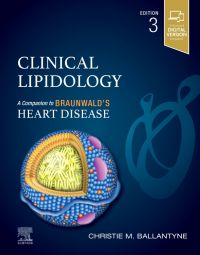Part of the renowned Braunwald family of references, Clinical Lipidology: A Companion to Braunwald’s Heart Disease provides today’s clinicians with clear, authoritative guidance on the therapeutic management of patients with high cholesterol levels and other atherogenic lipid disorders. An invaluable resource for cardiologists, lipidologists, endocrinologists, and internal medicine physicians, this one-stop reference covers everything from basic science and the pathogenesis of atherothrombotic disease to risk assessment and the latest therapy options. Now fully updated from cover to cover, the 3rd Edition offers unparalleled coverage of lipidology in an accessible and user-friendly manner.
Key Features
-
Thoroughly covers the assessment, diagnosis, and treatment of patients with elevated levels of lipids and lipoproteins, including all the latest research-based recommendations, therapeutic breakthroughs, and related clinical advances.
-
Presents the latest data on clinical guidelines, risk assessments, and established and emerging pharmacologic and nonpharmacologic therapies—all from internationally recognized experts in the field.
-
Features condensed, streamlined content that focuses on clinical applications and applying concepts to the practice setting. Chapters have now been completely reorganized into sections on risk assessment; therapy; new and evolving therapeutic targets and platforms; and special populations.
-
Includes new chapters on Polygenic Risk Scores; Inclisiran; Bempedoic Acid; Selective Peroxisome Proliferator–Activated Receptor–α Modulator: Pemafibrate; Evolving Therapeutic Targets: Lp(a), ANGPTL3, and ApoC-III; New Therapeutic Platforms: Gene Therapy and Genome Editing; and more.
-
Contains new or expanded content on inflammation; genetic testing; troponins for risk assessment; statins and role of bile acid sequestrants, niacin, and fibrates; mAbs; CANTOS and CIRT; colchicine; IL-6; and cellular, molecular, and genetic therapy.
-
Provides treatment algorithms throughout, as well as case vignettes that highlight the most common clinical questions in each chapter.
-
Incorporates the latest guidelines from the AHA, ACC, ESC, and EAS, as well as future directions for ongoing research and emerging applications.
-
Enhanced eBook version included with purchase. Your enhanced eBook allows you to access all of the text, figures, and references from the book on a variety of devices.
Author Information
By Christie M. Ballantyne, MD, FACP, FACC, Chief, Section of Cardiology, Chief, Section of Cardiovascular Research, Professor of Cardiovascular Medicine, Baylor College of Medicine, Houston, Texas
SECTION I INTRODUCTION/BASIC MECHANISMS
1 Overview of Lipids and Atherosclerosis
SECTION II RISK ASSESSMENT
2 Overview of Risk Assessment
3 Measurement of Low- Density Lipoprotein Cholesterol, Non–High- Density Lipoprotein Cholesterol, Apolipoprotein B, and Low- Density Lipoprotein Particle Concentration
4 Triglycerides, Triglyceride- Rich Lipoproteins, and High- Density Lipoprotein in Coronary Heart Disease Risk Assessment
5 Lipoprotein(a) in Cardiovascular Risk Assessment
6 Clinical Evaluation for Genetic Testing and Secondary Causes of Dyslipidemia
7 Polygenic Risk Scores
8 High- Sensitivity C- Reactive Protein
9 Emerging Assays for Risk Assessment
10 Imaging Atherosclerosis for Risk Stratifi cation: Cardiac Computed Tomography and Carotid Ultrasound
SECTION III THERAPY
11 Overview of General Approach to Management of Dyslipidemias
12 Treatment Guidelines Overview: American Heart Association/American College of Cardiology/Multisociety Guideline and Updates
13 Treatment Guidelines Overview: European Society of Cardiology/European Atherosclerosis Society Guidelines
14 Dietary Patterns for the Prevention and Treatment of Cardiovascular Disease
15 Updated Clinical Guide to Exercise and Lipids
16 Obesity, Lipids, and Cardiovascular Disease
17 Statins
18 Cholesterol Absorption Inhibitors
19 Omega- 3 Fatty Acids
20 Proprotein Convertase Subtilisin/Kexin Type 9 Inhibition
21 Inclisiran
22 Bempedoic Acid
23 Pemafi brate: A New Selective Peroxisome Proliferator–Activated Receptor–_Modulator for Hypertriglyceridemia Management
24 Anti- inflammatory Therapy for Cardiovascular Disease
25 Nutraceuticals and Functional Foods for Cholesterol Reduction
SECTION IV NEW AND EVOLVING THERAPEUTIC TARGETS AND PLATFORMS
26 Evolving Therapeutic Targets: Lipoprotein(a)
27 Inhibition of ANGPTL3 as a Target for Treating Dyslipidemias
28 Evolving Therapeutic Targets: Apolipoprotein C- III
29 Evolving Therapeutic Targets: Cholesteryl Ester Transfer Protein Inhibition
30 Gene Therapy and Therapeutic Genome Editing in Liver for Lipid Disorders
SECTION V SPECIAL PATIENT POPULATIONS
31 Special Patient Populations: Diabetes and Metabolic Syndrome
32 Special Patient Populations: Women and Older Adults
33 Special Patient Populations: Children and Adolescents
34 Special Patient Populations: Familial Hypercholesterolemia and Other Severe Hypercholesterolemias
35 Special Patient Populations: Treatment of Familial Chylomicronemia Syndrome and Sustained Chylomicronemia
36 Special Patient Populations: Acute Coronary Syndromes
37 Special Patient Populations: Transplant Recipients
38 Special Populations: Chronic Kidney Disease
39 Special Patient Populations: Lipid Abnormalities in High- Risk Racial/Ethnic Groups
40 Persons With Human Immunodeficiency Virus
Index




